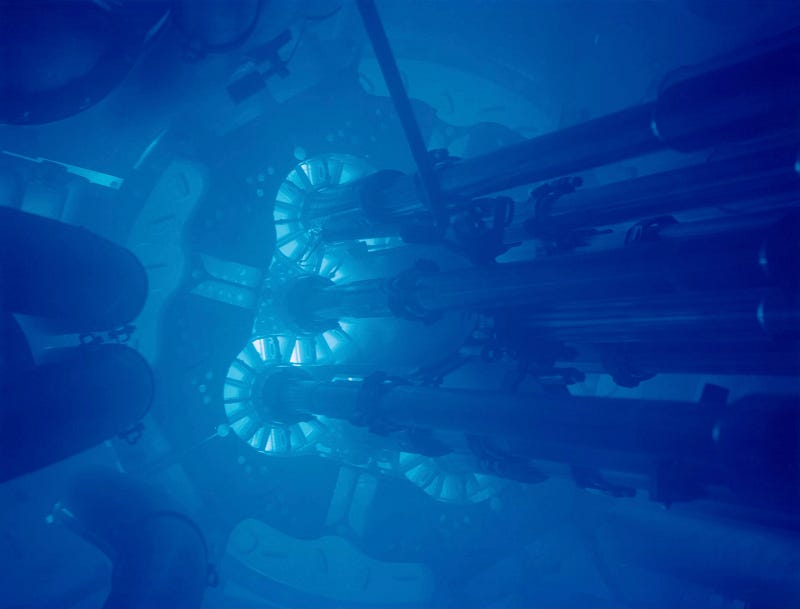Germany's Energy Shift: A Misguided Turn from Nuclear to Gas
Written on
Understanding Cherenkov Radiation

Cherenkov radiation, which emits a blue glow in active nuclear reactors, highlights the ongoing discussion around Germany's energy policies. Despite significant advancements in renewable energy over the past decades, Germany is now poised to invest €16 billion ($17.36 billion) into constructing four large natural gas plants. This decision raises eyebrows, especially since numerous studies have consistently shown that nuclear energy results in lower carbon emissions and is generally safer than solar energy. Since 2003, Germany has been working to phase out its nuclear power plants, a choice more driven by political pressures than by sound logic. The completion of this phase-out last year has resulted in a substantial energy gap that can only be partially filled by the new natural gas facilities, leading to significant environmental concerns.
The Reality of New Gas Plants
When announcing the construction of these new gas plants, the German government branded them as “modern, highly flexible, and environmentally friendly.” However, this characterization is misleading. While the government claims that these facilities could eventually run on carbon-neutral hydrogen from renewable sources, the practicality of this is questionable. Hydrogen electrolysis operates at a mere 75% efficiency, and combustion of hydrogen only achieves 22.5% efficiency. This results in an alarming round-trip efficiency of just 16.9%, indicating that 83.1% of the energy is lost in the conversion process. It begs the question: why engage in such a wasteful endeavor when we could directly utilize renewable energy instead?
This situation exemplifies a concerning trend of greenwashing, as the German climate agency acknowledged last year that the country is likely to fall short of its goal to reduce greenhouse gas emissions by 65% by 2030, largely due to the nuclear phase-out. This has sparked calls from various political factions to reinstate the nuclear reactors. However, Chancellor Olaf Scholz, who advocated for the nuclear exit and supported the gas plants, has dismissed these appeals, declaring, “Nuclear energy is over.” His administration’s attempts to frame these new plants as sustainable only serve to highlight the misguided nature of their energy strategy.
The Emissions Dilemma
So, what is the environmental impact of these new power plants?
Collectively, the four plants have a capacity of 10 GW, expected to generate approximately 80 TWh of electricity annually. This output is comparable to that of Germany's nuclear plants in 2011. However, the carbon emissions associated with this energy production will drastically increase—from around 320,000 tonnes of CO2 produced by nuclear energy to an alarming 6,240,000 tonnes from the new gas facilities. This represents an increase in emissions by a staggering factor of 19.5!
The missed opportunity for a cleaner energy grid is particularly disheartening. In the year 2000, Germany generated about 200 TWh from nuclear sources, yet by 2023, the nation relied on fossil fuels for approximately 211.6 TWh. Had Germany opted to maintain and slightly expand its nuclear capabilities over the last two decades, it could have nearly eliminated fossil fuels from its energy portfolio by now.
In contrast, the current strategy involves the construction of new gas plants that emit significant carbon, while still relying heavily on coal. This outcome underscores the risks of making energy decisions based on ideology and misinformation rather than empirical data. By prioritizing accurate statistics and actively countering misinformation, we could already be making substantial progress toward a sustainable future.
Supporting Sustainable Content
Thank you for engaging with this analysis. Your support is crucial for producing content like this. If you wish to contribute or access articles ahead of the public, consider following my project, Planet Earth & Beyond, on Bluesky or X.
Chapter 2: Insights from YouTube
To further explore the implications of Germany’s energy decisions, consider watching the following videos:
Is Germany's nuclear exit a mistake? This video discusses the ramifications of Germany's decision to phase out nuclear energy.
Why has Germany shut down its nuclear plants? This Inside Story video delves into the reasons behind Germany's nuclear phase-out.